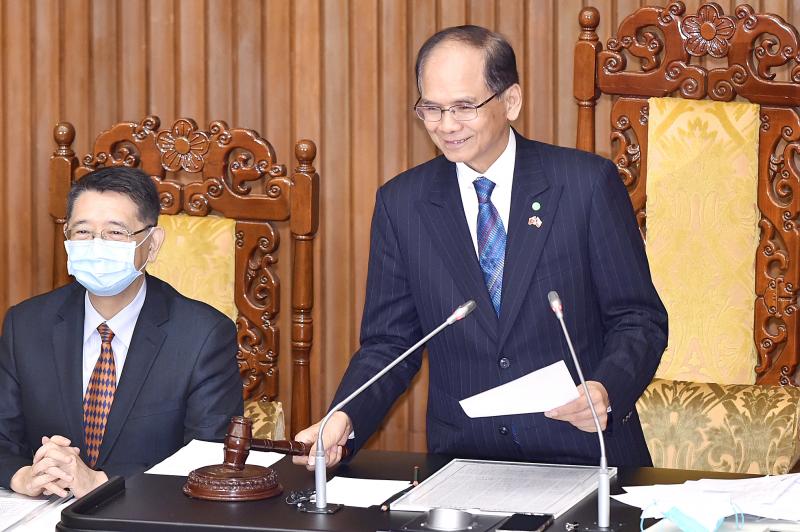Without slashing a dollar, legislators yesterday passed a NT$150 billion (US$5.02 billion) increase to the Special Budget for COVID-19 Prevention, Relief and Recovery.
Prior to passing the increase, lawmakers across party lines agreed — during a preliminary review held by six committees and subsequent cross-caucus talks — not to trim the budget, but to bail out industry sectors and individuals’ livelihoods beleaguered by the pandemic.
The budget increase — which builds on NT$60 billion in stimulus funding that was passed on Feb. 25 — is divided into two parts: NT$133.5 billion in relief funds and NT$16.5 billion for disease prevention.

Photo: Tu Chien-jung, Taipei Times
The increase is to cover subsidies for affected companies’ utilities, payroll and operating expenses; credit guarantees and interest subsidies; grants for lower-income households; and programs to spur consumer spending.
Minister of Finance Su Jain-rong (蘇建榮) said in the explanation for the increase that it would be entirely sourced from borrowing.
In addition to NT$210 billion allocated from special budgets, the government has reallocated NT$140 billion from the general budget and approved a NT$700 billion line of credit from government-owned financial institutions to support businesses affected by the pandemic.
The total NT$1.05 trillion relief package would be about 5.36 percent of Taiwan’s GDP for this year, which is forecast to be NT$19.58 trillion.
Several resolutions accompanying the budget increase were also passed.
One resolution said that the Financial Supervisory Commission would ban banks from approving subsidized loans to illegal factories established after May 19, 2016, in order to protect the environment.
New Power Party (NPP) Legislator Chen Jiau-hua (陳椒華), who sponsored the resolution, said that it was drafted in accordance with an amendment passed last year to the Factory Management Act (工廠輔導管理法), which said that newly established illegal factories should be torn down.
A resolution sponsored by the Chinese Nationalist Party (KMT) caucus calling for cash handouts for low and middle-income households was struck down after being put to a vote.
NPP caucus whip Chiu Hsien-chih (邱顯智) thanked the legislators for the nonpartisan support that the party’s other resolutions received, including one that prohibits the Ministry of Finance from penalizing banks that fall short of government targets for issuing subsidized loans.
KMT Legislator William Tseng (曾銘宗) said that several resolutions that he sponsored passed, including one requiring state-run banks to report to legislative committees any progress made in issuing subsidized loans.
The resolution would require the National Audit Office to review the amount of loans provided and report the results to the Legislative Yuan, and that the Executive Yuan report the progress and efficacy of the special budget within three months of the initial budget’s passage.
Democratic Progressive Party caucus secretary-general Chung Chia-pin (鍾佳濱) said that he hopes agencies would use the budget wisely so that taxpayers’ money can go to bailing out businesses.
Additional reporting by CNA

INVESTIGATION: The case is the latest instance of a DPP figure being implicated in an espionage network accused of allegedly leaking information to Chinese intelligence Democratic Progressive Party (DPP) member Ho Jen-chieh (何仁傑) was detained and held incommunicado yesterday on suspicion of spying for China during his tenure as assistant to then-minister of foreign affairs Joseph Wu (吳釗燮). The Taipei District Prosecutors’ Office said Ho was implicated during its investigation into alleged spying activities by former Presidential Office consultant Wu Shang-yu (吳尚雨). Prosecutors said there is reason to believe Ho breached the National Security Act (國家安全法) by leaking classified Ministry of Foreign Affairs information to Chinese intelligence. Following interrogation, prosecutors petitioned the Taipei District Court to detain Ho, citing concerns over potential collusion or tampering of evidence. The

NEGOTIATIONS: Taiwan has good relations with Washington and the outlook for the negotiations looks promising, Minister of Economic Affairs J.W. Kuo said Taiwan’s GDP growth this year is expected to decrease by 0.43 to 1.61 percentage points due to the effects of US tariffs, National Development Council (NDC) Minister Paul Liu (劉鏡清) said at a meeting of the legislature’s Economics Committee in Taipei yesterday, citing a preliminary estimate by a private research institution. Taiwan’s economy would be significantly affected by the 32 percent “reciprocal” tariffs slapped by the US, which took effect yesterday, Liu said, adding that GDP growth could fall below 3 percent and potentially even dip below 2 percent to 1.53 percent this year. The council has commissioned another institution

NEGOTIATIONS: The US response to the countermeasures and plans Taiwan presented has been positive, including boosting procurement and investment, the president said Taiwan is included in the first group for trade negotiations with the US, President William Lai (賴清德) said yesterday, as he seeks to shield Taiwanese exporters from a 32 percent tariff. In Washington, US Trade Representative Jamieson Greer said in an interview on Fox News on Thursday that he would speak to his Taiwanese and Israeli counterparts yesterday about tariffs after holding a long discussion with the Vietnamese earlier. US President Donald Trump on Wednesday postponed punishing levies on multiple trade partners, including Taiwan, for three months after trillions of US dollars were wiped off global markets. He has maintained a 10 percent

TRADE: The premier pledged safeguards on ‘Made in Taiwan’ labeling, anti-dumping measures and stricter export controls to strengthen its position in trade talks Products labeled “made in Taiwan” must be genuinely made in Taiwan, Premier Cho Jung-tai (卓榮泰) said yesterday, vowing to enforce strict safeguards against “origin laundering” and initiate anti-dumping investigations to prevent China dumping its products in Taiwan. Cho made the remarks in a discussion session with representatives from industries in Kaohsiung. In response to the US government’s recent announcement of “reciprocal” tariffs on its trading partners, President William Lai (賴清德) and Cho last week began a series of consultations with industry leaders nationwide to gather feedback and address concerns. Taiwanese and US officials held a videoconference on Friday evening to discuss the